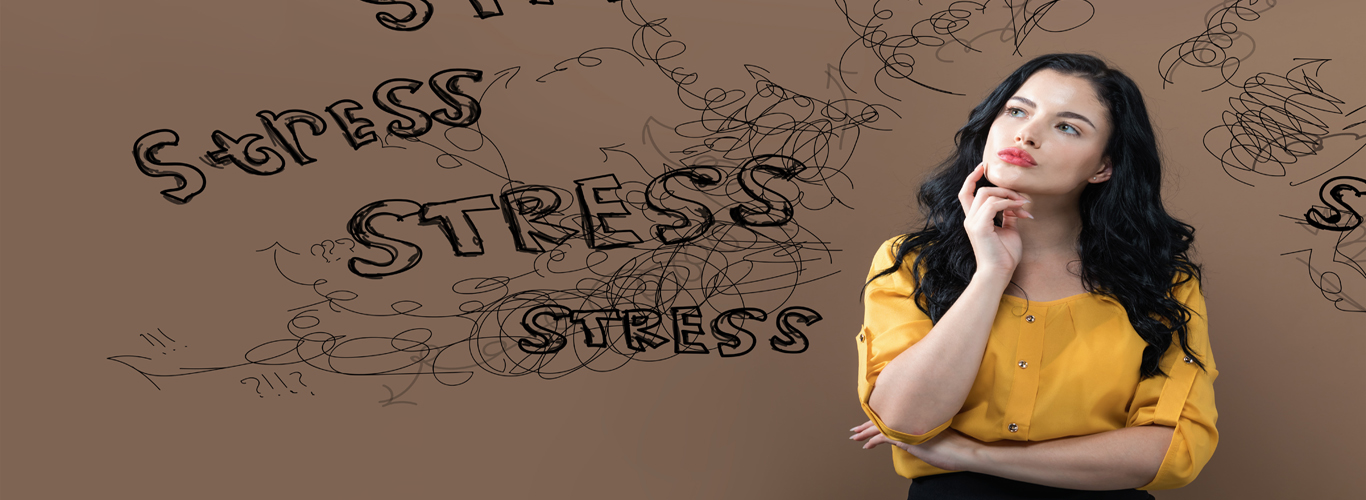Addiction and stress are related, according to studies. Everybody is affected by stress in some manner. The world in which we live is a million miles per second. Thus, when it comes to the subject of "stress," everyone can relate to it because it is an inevitable occurrence, whether it is in the form of internal conflict or tension related to money, education, relationships, or other areas. However, what exactly is stress and how does it affect our bodies? "Stress" is an evolutionary reaction that the body experiences in response to perceived biological, psychological, or social dangers. The body must get ready by dilation of the pupils, an increase in blood sugar and heart rate, and a readiness for the muscles to go into "fight or flight" mode. The body can then restore itself to its equilibrium condition (return to normal) once the stressor has subsided. Stressors can be divided into three groups since there are instances when we are not aware of what is stressing us out:
1. Psychological stressors: sadness, anxiety, difficulty regulating emotions, sleeplessness, etc.
2. Biological stressors, such as diseases and other health-related problems.
3. Social pressures, such as the family, the job, and relationships.
Is stress ever ;od?
It's crucial to remember that there are certain advantages to the stress that individuals experience. Research has indicated that a certain level of stress might improve our performance and increase our productivity. For example, it might provide you an advantage when studying for an exam. It might even improve your ability to function under pressure in a job or in a sporting event.
But there are more drawbacks to long-term stress than advantages.
Stress becomes increasingly detrimental to our physical and mental health when it is experienced over an extended period of time. Additionally, it may increase our risk of developing addictions and relapsing.
What happens to the body when we get stressed?
We'll look more closely at the mechanics of stress on our bodies now. The prefrontal cortex, the hypothalamus, and the amygdala are the three main structural components of the stress system. These components act to activate the hypothalamic-pituitary-adrenal (HPA) axis. The HPA axis is primarily responsible for controlling stress reactions. The first stressor triggers the amygdala, which then communicates with the neurons in the hypothalamus to initiate the process. Subsequently, the HPA is activated and the pituitary gland releases corticotropic hormone (CRH). Additionally, the CRH promotes the production of adrenocorticotropic hormone (ACTH), which in turn increases the adrenal cortex's release of cortisol (a stress hormone) into the bloodstream (Chrousos & ;ld, 1992). In reference to the fight-or-flight response, this is the outcome. Afterwards, the parasympathetic nervous system kicks in, lowering heart rate and encouraging relaxation, as the system settles down after the stressor has subsided.
Furthermore, there are two types of stress: acute stress, which is short-term, and chronic stress, which is long-term. Furthermore, as previously indicated, when we experience stress for a prolonged period of time, our bodies are unable to repair itself because the body releases stress hormones, which are toxins that our bodies must eliminate. which over time may significantly alter our bodies and increase our susceptibility to conditions like diabetes and coronary heart disease.
Now that we know how stress functions, how does stress make addiction more complex?
Over the years, numerous research studies have indicated a correlation between stress and susceptibility to addiction, whether it involves substances like drugs or alcohol. For instance, ;rders' study in 2002 examined the relationship between the HPA axis and self-administration of cocaine in laboratory rats. The brain features a reward circuit that enables us to experience pleasure, releasing neurotransmitters when activated. Among these neurotransmitters, dopamine plays a key role. Dopamine is responsible for enhancing our enjoyment of rewarding activities such as eating and engaging in sexual behaviours. When we engage in these actions, the release of dopamine signals to our body that these experiences are pleasurable, reinforcing these behaviours positively.
What happens to our brains when we are on drugs?
Substance use, like cocaine, alters the brain's functioning. When cocaine is consumed, it interferes with the typical neurotransmission process, leading to an extended presence of dopamine in the brain, resulting in feelings of euphoria. However, this becomes problematic because subsequent attempts by the brain to naturally release dopamine without drug influence result in reduced dopamine levels. Consequently, this leads to diminished feelings of happiness, lower moods, and even heightened anxiety. These negative experiences are unpleasant and can intensify the urge for drug consumption.
Why would being stressed make me want to take drugs?
The ;eders (2002) experiment compared rats subjected to stress hormone administration, such as corticosterone mimicking human stress, with normal rats. Results revealed that the stress hormone heightened sensitivity to lower doses of cocaine. This indicates that using drugs while experiencing stress amplifies the likelihood of addiction due to increased drug sensitivity. Therefore, individuals who are sensitive to stress and feel unable to manage stressors are more prone to substance abuse. Various scenarios, like an unhappy marriage, workplace dissatisfaction, or traumatic life events, have been linked to increased alcohol or drug use, serving as means to alleviate pain, anxiety, or depression (Jose et al., 2000; Vasse et al., 1998; Volpicelli et al., 1999).
Research also highlights the connection between stress and addiction relapse. Stress, whether psychological, physical, or social, can act as a triggering factor. Studies show that exposure to stress-related imagery can induce cravings and prompt drug-seeking behaviours, leading to relapse (Shinha et al., 2000). Therefore, it is crucial to identify past events, like trauma, that continue to affect us and address them. Recognizing these triggers can help in avoiding relapse and managing cravings associated with substance-seeking behaviours. Understanding our addiction plays a pivotal role in our self-awareness, potentially influencing our recovery journey.
Managing addiction through stress
At Samarpan, we offer a variety of tools and resources for our clients. These include psychoeducational classes, for example through Cognitive Behavioral Therapy (CBT), classes on relapses prevention along with Art Therapy and also holistic therapies like reiki. This has been demonstrated to be very informative and proven to be effective. Furthermore, we also offer meditation, massage, mindfulness and yoga. These activities have shown to be beneficial as relaxation techniques and help in stress reduction. This combined approach, can help to pave your way to recovery.
Why choose Samarpan?
Samarpan is a specialized international Substance Use Disorder (De-Addiction) and Process Addiction rehab in Pune, India that accepts a maximum of 26 clients. We only accept clients on a voluntary basis and have a highly structured program that encompasses the most effective approaches to Substance Use Disorder and addiction. The facility is set in the rolling hills Mulshi, with clients having either individual or shared rooms, in a modern resort like facility, staffed by Internationally Accredited Professionals. Samarpan is fully licensed under The MSMHA and is also an accredited ;RSKI-CENAPS Centre of Excellence offering a program from 5 to 13 weeks.
If you or someone you care about is considering treatment for substance use disorder or process addictions, we can help. Contact us now on admissions@samarpan.in or phone/WhatsApp us on +91 81809 19090.
References
;eders (2002) https://www.ncbi.nlm.nih.;v/pubmed/12023504
Withdrawals https://americanaddictioncenters.org/cocaine-treatment/withdrawal
Shinha et al. (2000) https://www.ncbi.nlm.nih.;v/pubmed/11057517
Cocaine and reward system in brain youtube.com/watch?v=yeAN26kJuTQ
https://www.psychologytoday.com/intl/blog/science-choice/201705/stress-and-addiction
http://citeseerx.ist.psu.edu/viewdoc/download?doi=10.1.1.325.8527&rep=rep1&type=pdf




























